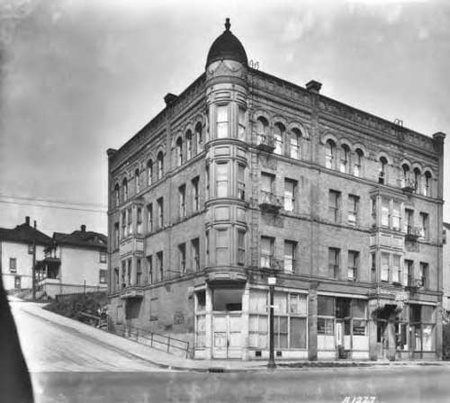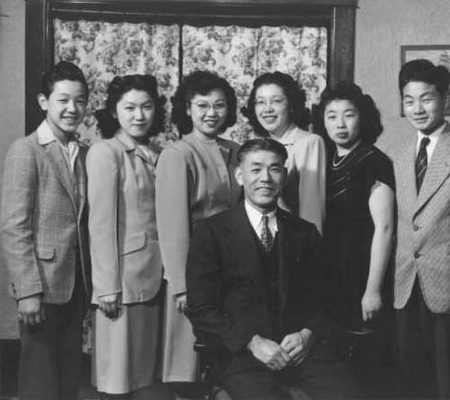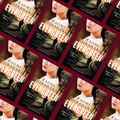As I’m writing this essay, I have moved between the despair I mentioned last month and the hope that I have for the future. My daughters went to their first protest march; my oldest daughter made her first call to a senator without being prompted or asked.
Living in Washington State, as we do, it’s hard not to feel despair, as I did this morning when I read that a newspaper in Kennewick, Washington published an editorial defending the logic of WWII Japanese American incarceration. And it’s hard not to feel hope when our governor, Jay Inslee, invoked this same history of Japanese Americans when condemning the recent executive order banning United States entry for refugees and citizens from seven Muslim-majority countries; a few days later, our state’s Attorney General announced plans to sue the federal government over this ban. Overall, it has been an exhausting few weeks, but I have resolved to practice self-care and continue writing.

One of the projects I’ve been working on involves the fascinating story of a Tacoma Issei man. After writing an article on the history of Tacoma’s (now-extinct) Japantown, I’ve been working hard on one project related to one Tacoma hotel in particular, the Columbus Hotel. Although I usually learn my history through a person or a narrative, I’ve learned this history through one place, and it’s been fascinating.
The Columbus Hotel opened in the late nineteenth century, with three hotel floors on top and shops and a hall at the street level. In 1918 the hotel’s 1,000 square foot hall was rented and renovated for the second location of the Tacoma Buddhist Temple before the Temple found a permanent location in 1931. The ground floor was also occupied by a jiujitsu studio and a Chinese apothecary.
But while rummaging through the archives of Tacoma’s Japanese American history, the story of the Japanese American grocer who occupied the ground floor of the Columbus Hotel for nearly a decade—Mr. Shuichi Fukui captured my imagination the most. Once I started to look, Fukui was everywhere, from the history books to the camp newsletters to the professional family portraits digitally archived in the public library. And yet I had never heard of him.
Here is what I can piece together of his remarkable story. If anyone has more information that I can add to his story, please let me know.
SHUICHI FUKUI
Born in 1894 in Yamaguchi-ken, Japan, Fukui was among the early waves of Japanese immigrants and came to the United States to seek his fortune in 1912. Before he became a United States citizen, he volunteered to serve in its army reserves and completed basic training in Hawai‘i, making him one of the few Japanese American veterans of World War I. He and Sadaichi Fujita, both from Tacoma, were among the first Japanese Americans veterans to file for citizenship (Magden 86).

As a journalist and editor, Fukui participated in the making of Tacoma’s vibrant Japantown (Nihonmachi) community. He worked as a bookstore operator and served as a Tacoma correspondent for the Hokubei Hochi, a Seattle Japanese language newspaper. Just before World War II, Fukui had become the last editor and owner of Tacoma’s own Japanese language newspaper, the Takoma Shuho (Tacoma Japanese Weekly). He had also just completed a new edition of the first major work of early Japanese American Tacoma history, Tacoma Nihonjin Hattenshi (History of the Japanese in Tacoma). The first edition of this history had been compiled by Shunichi Otsuka; Fukui added material and reorganized the volume, which remained in Japanese until it was translated in 1986 by Dr. James Watanabe (Magden 239). To this day, the volume remains one of the two major primary sources of history of Tacoma’s Japanese Americans.
Fukui was also known for his loyalty to his adopted country. When reached for comment by the Seattle Daily Times the day after Japan’s attack on Pearl Harbor, Fukui responded: “We Japanese living in the United States are Americans.” Like the seven hundred-plus Japanese in Tacoma, Fukui was forcibly removed to the temporary Pinedale Assembly Center near Fresno, California. The newsletter for the Assembly Center featured Fukui in an ongoing resident spotlight feature. In the July 4, 1942 issue of the Pinedale Logger, Fukui reiterated his loyalty to the United States despite his imprisonment:
We should do our part in helping our country during this critical period. She needs the co-operation of every American and if our job is to stay in these internment centers, we must and should do our utmost in co-operating with the authorities so that their task and our task is as easy and pleasant as possible. We all must sacrifice and give our best so that our way of life—which is the only way of life for a free people—may be preserved for now and ever more.
By this point, according to the newsletter article, Fukui had become “well known through the Northwest for his patriotic views in helping the Nisei become the finest type of Americans.” After Pinedale, Fukui and his family were imprisoned in Tule Lake, California, from July 1942 to March 1943.
Upon returning to Tacoma, Fukui began selling rice and then expanded into a grocery store in the Columbus Hotel, formerly a part of Tacoma’s Japantown. In a 1965 interview, he maintained that he did not face prejudice from Tacoma’s, since he was mainly selling to “other Orientals.”
Fukui was married twice; his wives were named Kikuyo (from Hawai‘i) and Harue. Between the two marriages, the family had five children: Tamiko Alice, Edwin, Lillian, Lucy, and Herbert Megumu. Both of Fukui’s sons served in the United States military. Edwin was killed in action near Okinawa. The elder Fukui spoke at the funeral on behalf of himself and other parents of Nisei veterans killed in action during the war. His other son, Herbert, was returning home to visit his parents on leave when he was killed in an accidental plane crash. According to a Seattle Daily Times article, the older Fukui received the news “quietly” and then went back to serving his customers behind the grocery store counter.
Fukui’s store marked an important point of resettlement for the few Japanese Americans—less than one in seven—who decided to return to Tacoma. After he sold his grocery store in the 1950s he owned another business, the Tokyo Gift Shop, until his death in 1967.
Sources:
“C-47 Crash Took 2nd Son of Tacoma Family.” Seattle Daily Times. March 25, 1948.
“Fukui, Sbuichi.” “Fukui, Tamiko.” Fukui, Herbert.” “Fukui, Lillian.” “Fukui, Lucy.” “Fukui, Edwin.” Densho Digital Repository Names Registry, Accessed 1/31/17.
“Pacific Northwest Japanese American Newspapers on Microfilm.” Japanese American Newspapers Held in the University of Washington Libraries. Accessed 1/15/17.
“Shuichi Fukui, American Tacoma Issei Served in First World War.” Pinedale Logger V.1:7, July 3, 1942. Densho.
Ronald Magden, Furusato: Tacoma-Pierce County Japanese. Nikkeijinkai Tacoma Japanese Community Service, 1998.
Shunichi Otsuka, History of the Japanese in Tacoma translated from the Japanese by James Watanabe (Pacific Northwest District Council, Japanese American Citizens League, [1917] 1988).
Charles Ptolemy, “The Evacuation of Japanese Americans from Washington During World War II: A Case Study in Discrimination.” (Master’s thesis, Central Washington University, 1965)
© 2017 Tamiko Nimura





